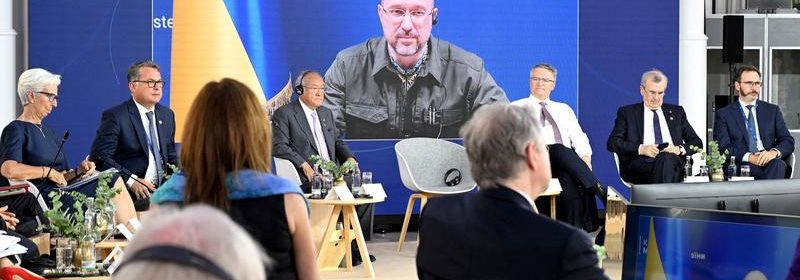G7 agree on $18.4 billion to keep Ukraine running, ready with more

KOENIGSWINTER, Germany (Reuters) -The Group of Seven’s financial leaders agreed on Thursday on $18.4 billion to help Ukraine pay its bills in coming months and said they were ready to stand by Kyiv throughout its war with Russia and do more if needed, a draft communique showed.
Finance ministers and central bank governors of the United States, Japan, Canada, Britain, Germany, France and Italy – the G7 – are holding talks as Ukraine, invaded by Russia on Feb. 24, is struggling to fend off the attack and is running out of cash.
“In 2022, we have mobilised $18.4 billion of budget support, including $9.2 billion of recent commitments,” the draft communique seen by Reuters said.
“We will continue to stand by Ukraine throughout this war and beyond and are prepared to do more as needed,” it said.
In the draft, the G7 welcomed the European Commission’s proposal on Wednesday to lend 9 billion euros to Ukraine and noted that the European Bank for Reconstruction and Development and the International Financial Corporation planned support worth $3.4 billion. But it was not clear if these funds were part of the $18.4 billion or separate.
Earlier on Thursday, German Finance Minister Christian Lindner said Germany would grant Ukraine 1 billion euros and Japan pledged to double its aid for Ukraine to $600 million to help it cover its near-term needs.
Ukraine estimates it needs some $5 billion a month to keep public employees’ salaries paid and the administration working despite the daily destruction wrought by Russia.
The war has been a game-changer for Western powers, forcing them to rethink decades-old relations with Russia not only in terms of security, but also in energy, food and global supply alliances from microchips to rare earths.
More broadly, the G7 policymakers are wrestling with the question of how to contain inflation and increase sanctions pressure on Russia without causing recession.
More and more officials have brought up the term “stagflation” – the dreaded 1970s combination of persistent price increases coupled with economic stagnation.
“G7 central banks are closely monitoring the impact of price pressures on inflation expectations and will continue to appropriately calibrate the pace of monetary policy tightening in a data-dependent and clearly communicated manner, ensuring that inflation expectations remain well anchored, while being mindful to safeguard the recovery and limit negative cross-country spillovers,” the draft said.
LONG-TERM REBUILDING
The European Commission proposed on Wednesday to set up a fund of unspecified size of grants and loans for Ukraine, possibly jointly borrowed by the EU, to pay for post-war reconstruction.
The G7 said they were supportive, but avoided any detail.
“We call on all partners to join us in supporting Ukraine´s long-term recovery and to ensure the massive joint effort for reconstruction is closely coordinated, including with the Ukrainian authorities and international financial institutions,” the draft said.
Economists’ estimates of the cost of rebuilding Ukraine vary widely between 500 billion euros and 2 trillion euros ($524 billion to $2.09 trillion), depending on the assumptions on the length of the conflict and the scope of destruction.
With sums of such magnitude, the EU is considering not only a new joint borrowing project, modelled on the pandemic recovery fund, but also seizing the now frozen Russian assets in the EU, as sources of financing.
Some countries like Germany, however, say that the idea, though politically interesting, would be on shaky legal grounds and the G7 draft communique did not mention the issue.
($1 = 0.9550 euro)
Source: Read Full Article
